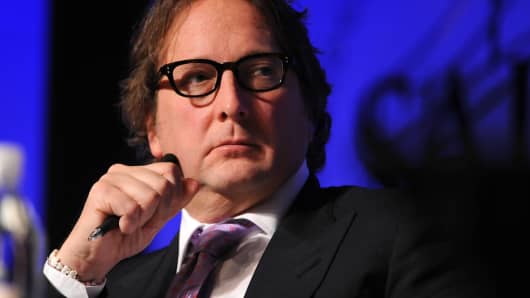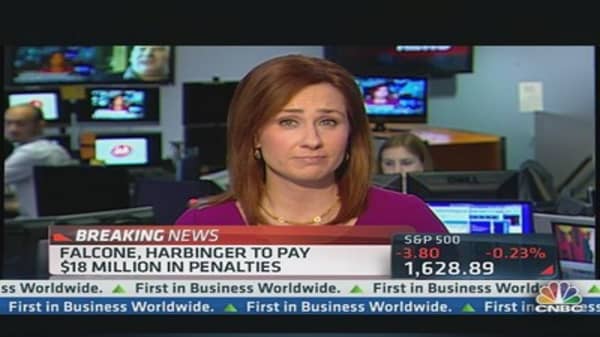The agreement with regulators would bring to a close one of several major problems for the beleaguered money manager. Falcone, 50, made a bad bet when last year LightSquared, a wireless telecom company his hedge fund owned, was forced to file for bankruptcy protection.
That bankruptcy filing and the regulatory issues that attracted SEC attention have come to tarnish the reputation of Falcone as a savvy debt trader, who made billions betting against the U.S. housing market on the eve of the financial crisis.
A federal judge and the SEC commissioners must still approve the settlement.
The SEC accused Falcone of market manipulation, giving preferential treatment to certain investors and borrowing cash from his own fund to pay his personal taxes.
The government asserted that at the height of the financial crisis, when many of the fund's assets were tied up in the collapse of Lehman Brothers, Falcone let select investors get out while denying that opportunity to others.
The SEC also claimed Falcone illegally loaned himself $113 million from the fund to pay his taxes, leaving investors unable to access their own money. Falcone eventually repaid the loan.
Falcone did not immediately respond to a request for a comment. The SEC declined to comment.
"Falcone's high-profile," said Ron Geffner, a hedge fund lawyer who is not involved in the case. "Reputationally, it will follow Mr. Falcone for his entire career.
As part of the deal, Falcone will be barred for two years from associating with broker-dealers and investment advisers, with the exception of the nine investment advisers managing Harbinger's hedge funds.
Through this exception, Falcone will be able to oversee a slow unwind of his hedge funds' investments, which include private-equity-style, tie-ups overseas, and return money to investors as they submit redemptions.
He will continue to run Harbinger Group, the publicly traded company that also reported its earnings on Thursday.
Falcone, in a press release accompanying the earnings, said he had grown the business "from a shell company holding approximately $150 million in cash and short-term investments to a diversified holding company with over $27 billion in assets and four key operating subsidiaries in the consumer products, insurance, energy and financial services business."
He added: "I believe that HGI is well positioned for the next phase of its evolution, and we are excited about the future."
Society Set
Falcone grew up poor in Chisholm, Minn., an iron mining town of 5,000 near the Canadian border. The youngest of nine, he grew up in a three-bedroom home.
A smart student, Falcone attended Harvard University where he was a star hockey player and graduated in 1984 with a degree in economics. After developing an expertise in credit markets as a high-yield and distressed securities trader at Kidder Peabody, Falcone set off on his own, often returning to his roots and hiring former Harvard hockey players to work with him.
His big bet on the collapse of the housing market gave him the dollars to catapult himself and his wife, Lisa Maria, into the New York society.
In 2009, he paid $49 million for a 27-room Manhattan townhouse that used to be the home of former Penthouse publisher Bob Guccione. The five-story mansion, where the couple lives with their twin daughters, boasts an indoor swimming pool.
In 2011, the couple was featured in Vanity Fair, in a story that focused on the risk of the LightSquared investment and their lavish lifestyle.
Falcone's personal wealth has helped him return to his hockey roots. He is a minority owner of the National Hockey League's Minnesota Wild. And more recently, he acquired an ownership stake in the Dubuque Fighting Saints, a minor league hockey franchise in Dubuque, Iowa.
In many ways, Falcone's fall from grace in the $2.2 trillion hedge fund industry was ordained even before the SEC sued him.
A little more than a year ago, his hedge fund owned 96 percent of LightSquared, a venture that depended on government approval to build a high-speed, wireless network that tests eventually showed would risk interfering with the Global Positioning Systems.
When the Federal Communications Commission failed to give final approval to the venture, LightSquared was forced to file for bankruptcy protection, which led to heavy losses at Harbinger in 2012.
Falcon's assets under management, which peaked in 2007 at about $26 billion, have shrunk to roughly $3 billion this year.
The cases in the U.S. District Court, Southern District of New York, are: Securities and Exchange Commission v. Harbinger Capital Partners LLC et al, No. 12-5028, and Securities and Exchange Commission v. Falcone, No. 12-5027.




